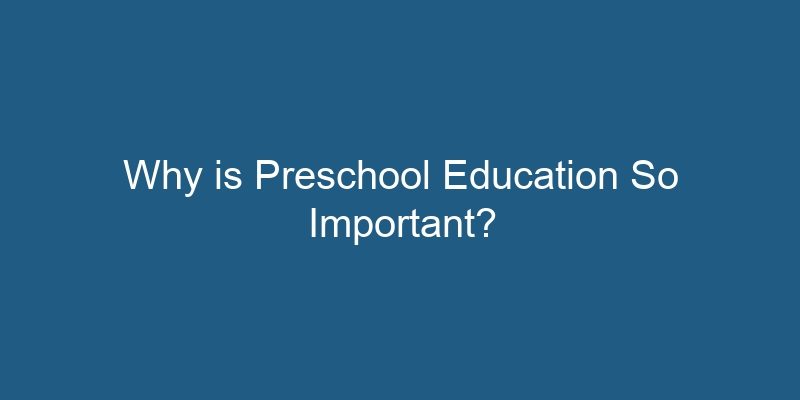Preschool education plays a crucial role in shaping a child’s development and preparing them for future academic success. It lays the foundation for learning, socialization, and cognitive growth. In this article, we will explore the various reasons why preschool education is so vital, highlighting its impact on a child’s physical, emotional, and intellectual development.
- The Benefits of Early Childhood Education
- 1. Cognitive Development
- 2. Social and Emotional Development
- 3. Language and Communication Skills
- 4. Physical Development
- 5. Preparation for Formal Education
- Key Factors in Effective Preschool Education
- 1. Qualified and Skilled Teachers
- 2. Play-Based Learning
- 3. Developmentally Appropriate Curriculum
- 4. Parent Involvement
- 5. Safe and Nurturing Environment
- The Long-Term Impact of Preschool Education
- 1. Academic Success
- 2. Social and Emotional Well-being
- 3. Reduced Achievement Gap
- 4. Economic Benefits
- In Conclusion
The Benefits of Early Childhood Education
Preschool education offers numerous benefits that contribute to a child’s overall development. Let’s delve into each of these advantages:
1. Cognitive Development
Preschool education provides children with a structured learning environment that fosters cognitive development. Through educational activities, such as puzzles, games, and storytelling, children enhance their problem-solving skills, critical thinking abilities, and language acquisition. They learn to follow instructions, develop attention span, and cultivate a love for learning.
2. Social and Emotional Development
Preschool offers a unique opportunity for children to interact with their peers and teachers, promoting social and emotional development. They learn important social skills, such as sharing, taking turns, and cooperating with others. By engaging in group activities, children develop empathy, communication skills, and self-confidence.
3. Language and Communication Skills
Preschool education plays a fundamental role in language and communication development. Through storytelling, singing, and engaging in conversations, children improve their vocabulary, grammar, and pronunciation. They also learn to express themselves effectively, boosting their confidence in verbal communication.
4. Physical Development
Preschool programs incorporate physical activities that promote gross and fine motor skills development. From running, jumping, and climbing to drawing, cutting, and writing, children strengthen their muscles, coordination, and dexterity. These physical skills lay the foundation for future academic tasks, such as writing and drawing.
5. Preparation for Formal Education
Preschool education prepares children for the transition to formal schooling. It introduces them to routine, structure, and following instructions, which are essential skills for success in primary school. By familiarizing children with the learning environment and academic concepts, preschool helps ease the transition and reduces anxiety.
Key Factors in Effective Preschool Education
For preschool education to be effective, certain factors must be considered. Let’s explore the key elements that contribute to high-quality preschool programs:
1. Qualified and Skilled Teachers
Highly qualified and skilled teachers are crucial for delivering quality preschool education. They possess the knowledge and expertise to create stimulating learning environments, design age-appropriate activities, and provide individualized attention to each child. Teachers with a strong foundation in early childhood education can effectively support children’s development.
2. Play-Based Learning
Play is an essential component of preschool education, as it promotes active learning and exploration. Play-based learning allows children to develop their creativity, problem-solving skills, and social interactions. By engaging in imaginative play, children learn to navigate real-life situations, express their emotions, and develop their sense of self.
3. Developmentally Appropriate Curriculum
A developmentally appropriate curriculum is tailored to meet the unique needs and abilities of preschool-aged children. It encompasses activities that align with their cognitive, social, emotional, and physical developmental milestones. A well-designed curriculum ensures that children are challenged, engaged, and supported in their learning journey.
4. Parent Involvement
Parent involvement is crucial in preschool education. Collaborative partnerships between teachers and parents create a supportive and enriching environment for children. Regular communication, parent-teacher conferences, and involvement in classroom activities enable parents to actively participate in their child’s learning process.
5. Safe and Nurturing Environment
A safe and nurturing environment is essential for preschool education. It provides children with a sense of security, enabling them to explore, take risks, and learn. Adequate supervision, child-friendly facilities, and a positive social climate contribute to children’s overall well-being and happiness.
The Long-Term Impact of Preschool Education
The benefits of preschool education extend beyond the early years. Research has shown that children who attend high-quality preschool programs experience long-term positive effects. Here are some of the long-term impacts:
1. Academic Success
Children who receive a strong foundation in preschool education are more likely to achieve academic success in later years. They enter primary school with enhanced language, literacy, and numeracy skills, giving them a head start in their education journey. These children often exhibit higher levels of motivation, engagement, and curiosity towards learning.
2. Social and Emotional Well-being
Preschool education fosters social and emotional skills that contribute to long-term well-being. Children who develop strong social skills in preschool have better peer relationships, higher self-esteem, and improved mental health. They are better equipped to handle challenges, build positive relationships, and adapt to new environments.
3. Reduced Achievement Gap
High-quality preschool education has been proven to reduce the achievement gap between disadvantaged children and their peers. It provides an equalizing platform that promotes equity and access to quality education. By addressing early learning gaps, preschool education sets the stage for a more inclusive and fair society.
4. Economic Benefits
Investing in preschool education yields significant economic benefits for individuals and society. Studies have shown that high-quality early childhood education programs result in higher employment rates, higher salaries, and reduced dependence on social welfare programs later in life. It also contributes to economic growth and productivity.
In Conclusion
Preschool education plays a critical role in a child’s development and lays the groundwork for future success. Its impact on cognitive, social, emotional, and physical development cannot be overstated. By providing a nurturing environment, qualified teachers, and a play-based curriculum, preschool education sets children on a path towards academic achievement, social well-being, and lifelong learning.










